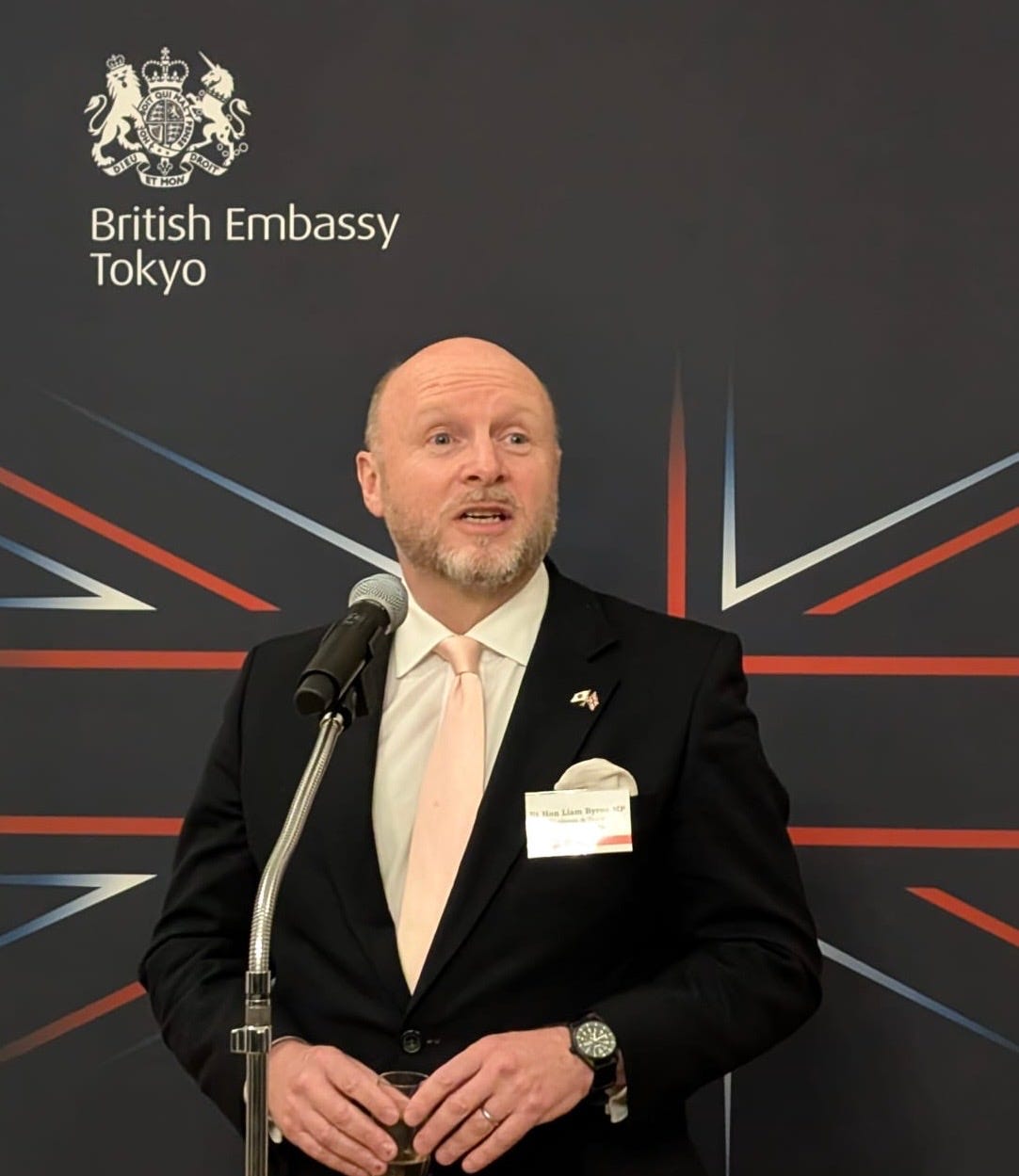Now what?
As we mark the 30th anniversary of the WTO this week, it’s time for Britain to help rally Free Trade World
The cherry blossom may have been in bloom, but there wasn’t much cheer in Tokyo this week as the Trump tariffs landed. Japan was hit hard just as its economy is beginning to emerge from a long season of woe, with almost three decades of lost growth.
But from conversations between Japanese policymakers and the Business Committee this week, I can see five basic steps sensible nations are now taking in response to the America’s enfilade of bad decisons. And as we head towards the 30th anniversary of the World Trade Organization this week, there is a moment when the UK and its free-trading allies must make a bold statement about our shared intent to strengthen and deepen the rules-based trading system and the world’s liberty of commerce.
1. Keep talking.
Despite the pain, the wisest voices are using careful language about the importance of keeping the Americans in the conversation. In the early days of President Trump’s re-election, it was said that he should be taken seriously but not literally. That advice now looks mistaken. We need to take the President literally. But for how long? It’s quite possible that the sheer scale of the market meltdown could trigger a new willingness to negotiate exemptions—especially as awareness grows of the ‘fuzzy maths’ used to calculate the tariffs. So we need to keep talking…
2. Get ready to retaliate.
…But we can’t take retaliation completely off the table. Not completely. I suspect, in the end smaller economies like us and even Japan, are unlikely to retaliate big time for the simple reason that it’s always possible to make a bad situation worse. Most economic models show that tit-for-tat retaliation slaughters growth even more than the original tariffs. And in reality, there are only two apex predators of the global economy - the EU and China - which are large enough to inflict so much pain on the U.S. that it might cause the President to reconsider.
3. Prepare to support your industries.
This new malice of our time has plunged industries around the world - and those who work in them - into a theatre of suffering. But across the West, many countries were already preparing industrial policy to reinvent state support for new times. These plans will now need to be bigger and faster to ensure that export-heavy industries don’t shutter factories or lay off workers. It will be an uncertain deliverance and here in the UK, firms are already under extra pressure from the rise in NICs, the National Minimum Wage, and the Employment Rights Bill. So we have to accelerate publication of our industrial policy, and make sure the Comprehensive Spending Review has plenty to back it up, which in turn means….
4. Rethink your economic rules.
Everyone will need to revisit their economic frameworks in light of the Trump tariff tantrum. The shock isn’t quite on the scale of the Global Financial Crisis, and it’s perhaps a third the size of COVID—but it’s still significant.
The tax hit to the UK Chancellor of the Exchequer could be as high as £5.5–6 billion. It will likely be less, depending on whether the impact of the tariff shock is concentrated in falling exports or whether it also hits consumption and investment. (Exports are more lightly taxed than consumption or labour, so marginal tax yields are lower.) But the impact will still likely run into billions. And this comes on top of the required rise in defence spending. We cannot sail on as if nothing has happened. We don’t yet know whether America’s tariffs will stick—but we must start planning for the worst-case scenario.
5. Charge up #FreeTradeWorld.
Finally—and perhaps most importantly—free traders must step up and build a coalition of the willing, a Free Trade Front, to defend and extend the free and open global economy.
We are not mere marionettes of American policy, nor are we without hope. WTO Director-General Dr. Ngozi Okonjo-Iweala reminded us this week that three-quarters of global trade still flows under the WTO’s Most-Favoured-Nation (MFN) terms. That’s a good place to start.
Britain is in a unique place to help lead this drive. We are connected to two major trade blocs—the EU and CPTPP—which together now account for about a third of global GDP. Expanding these blocs is good for global free trade. We should lead the argument.
Japan has long seen CPTPP as strategically vital in building an ever-wider alliance of free traders across the Asia-Pacific. If Indonesia’s accession is approved, the bloc would grow by around $1 trillion to over $13 trillion. And there are many more countries in the queue. The UK and Japan are the two largest economies in CPTPP. So, we should be pulling together with our Japanese allies in a major push to expand CPTPP across the ‘free and open’ Indo-Pacific, working with our defence allies, Australia and Canada.
But far more significant is the potential prize of an ambitious reset in UK–EU relations—a process that will begin in earnest in May when Keir Starmer and President von der Leyen meet for their summit.
Our committee has just published a report outlining what that reset could include. It’s clear that, if we’re ambitious, we could offset much of the damage from Trump’s tariffs by deepening cooperation in twenty major areas—strengthening our joint security, growing our economy faster, and raising living standards for the people we serve.
Our 20 practical proposals span the short and medium term, and include:
• A new EU–UK security pact to coordinate on defence industrial strategy, protect shared critical infrastructure, and tackle unfair trade practices such as industrial subsidies, state-owned enterprises, and forced tech transfers from competitors like China.
• Prioritising energy cooperation—reconnecting electricity trading systems to unlock the full potential of the ‘world’s largest wind farm’ in the North Sea, and developing a shared Carbon Border Adjustment Mechanism.
• Transforming support for the UK goods sector—through an ambitious SPS agreement, a multi-year settlement on fisheries, a major customs overhaul to reduce red tape at the border, and rejoining the Pan-Euro-Mediterranean Convention on rules of origin.
• Developing long-term regulatory roadmaps to ensure compatible regulation where mutual gains are possible, and reviewing mutual recognition of conformity assessments for product safety.
• Supporting the UK’s growing services trade—by securing a permanent data adequacy agreement, enhancing R&D collaboration, improving regulatory cooperation in financial services, exploring mutual recognition of professional qualifications, and launching a focused, visa-based youth mobility scheme.
Today, our relationship with the EU is stuck in yesterday’s logic. Tinkering won’t do. We need a bold, pragmatic, forward-looking reset.
You can read the report here: https://committees.parliament.uk/publications/47395/documents/245647/default/
Free traders of the world unite. Let me know what you think!





